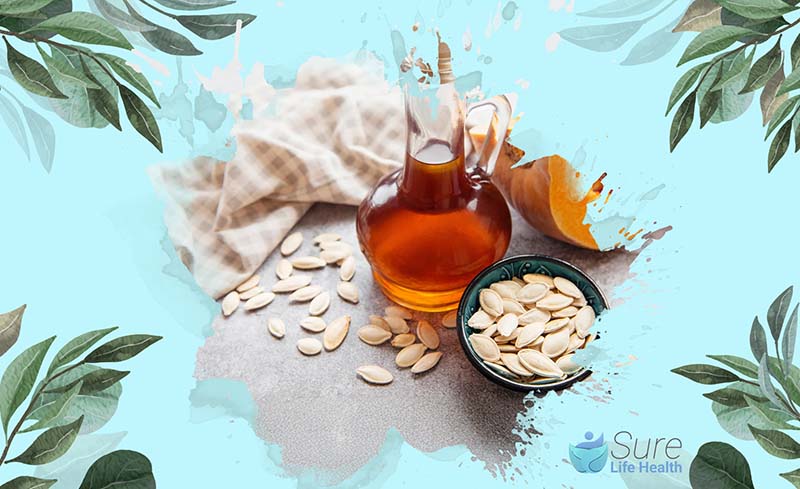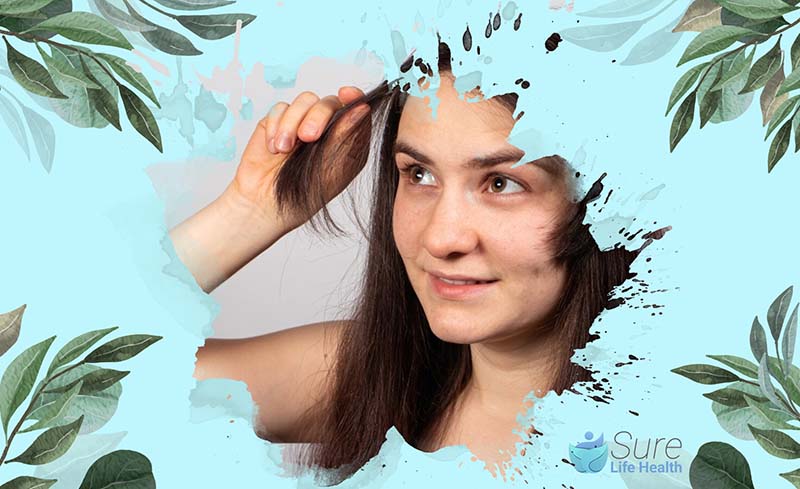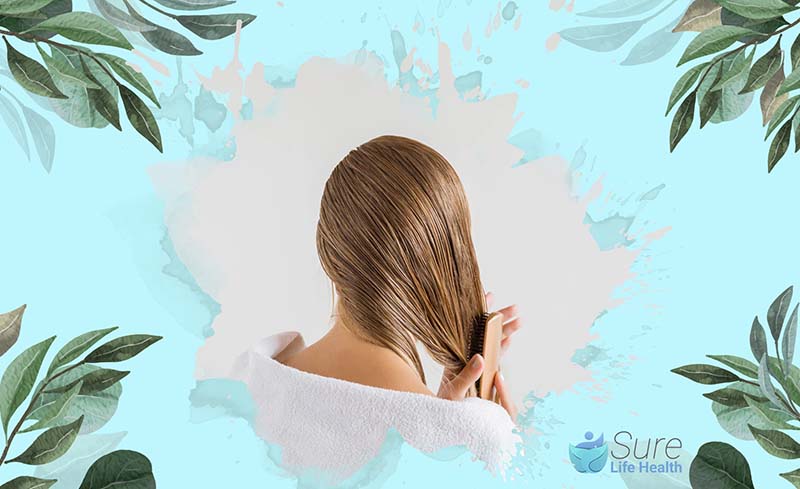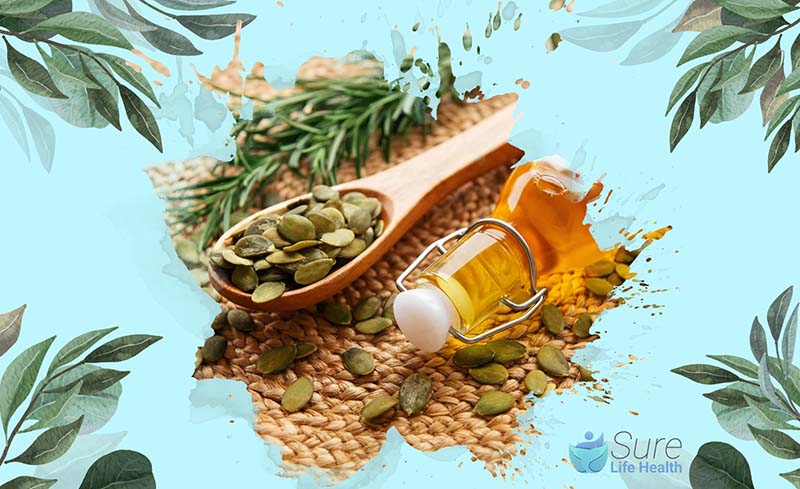Experiencing hair loss can be distressing, and you may find yourself exploring every possible remedy to regain thick, vibrant hair. This journey often leads to the discovery of numerous natural solutions gaining traction for their effectiveness.
Pumpkin seed oil is one such remedy that has captured the interest of many battling hair thinning and loss.
But does it really live up to expectations? In this discussion, we will look at the benefits and potential uses of pumpkin seed oil for hair health.
Is Pumpkin Oil Good for Hair?
Pumpkin seed oil is increasingly recognized as an effective treatment for hair growth, particularly for types of hormonal hair loss like male or female pattern baldness.
A recent 2021 study suggests that pumpkin seed oil might rival the efficacy of minoxidil foam, a well-known treatment for hair loss, particularly in women with pattern hair loss.
Moreover, earlier research supports the notion that oral consumption of pumpkin seed oil can enhance hair growth in men suffering from alopecia.

Benefits of Pumpkin Seed Oil for Hair
Using pumpkin seed oil in your hair care routine is gaining popularity as a method to maintain healthy hair. What specific advantages does this natural oil offer for your hair?
Reinforces Hair Strands, Enhancing Strength
Pumpkin seed oil is packed with vital nutrients that bolster hair strength. Consuming just two tablespoons of pumpkin seed kernels provides approximately 1.2 milligrams of biotin.
This essential B vitamin not only strengthens hair and nails but also helps combat fungal infections.
Additionally, pumpkin seed oil contains antioxidants such as manganese, zinc, and tryptophan. These combat free radicals that can lead to cellular damage, which in turn might cause hair loss and color changes.

Boosts Hair Shine
Enhancing your hair’s shine is another fantastic benefit of pumpkin seed oil, thanks to its high linoleic acid content.
This omega-6 fatty acid plays a crucial role in maintaining hair health and improving hair strength, giving your hair a lustrous, healthy glow.
Hydrates Hair, Providing Moisture
Pumpkin seed oil, a medium-weight oil with a melting point similar to coconut oil, becomes liquid at around 76°F (25°C). This property makes it excellent for moisturizing dry hair.
However, use moderately to avoid making your hair too greasy. A recommended amount is half a teaspoon of pumpkin seed oil for treating a half palmful of dry hair.
Functions As A Hair Color Mask
Pumpkin seed oil can also rejuvenate your hair color, enhancing both existing shades and new, unsaturated growth. Its pigmentation properties can accentuate hair colors, either by intensifying or subtly toning down the hues.
The oil’s nourishing effect strengthens hair, allowing color dyes to penetrate deeper and sustain their vibrancy longer. For the best results, ensure that the oil used is 100 percent pure pumpkin seed oil, devoid of any additives, to maintain the health and color of treated hair.

Targets Hair Damage For Repair
Pumpkin seed oil is rich in anti-inflammatory fatty acids, such as oleic acid, linoleic acid, and linolenic acid, which are essential for treating and repairing hair damage.
Additionally, zinc within the oil also boasts anti-inflammatory properties, further aiding in the restoration of damaged hair. This combination not only soothes the scalp but also helps in the recovery of hair strands from environmental and styling stress.
Contains Hair Coloring Properties
Pumpkin seed oil also possesses natural hair coloring capabilities, owing to its rich composition of vitamins, minerals, and antioxidants that mitigate oxidative stress—which often leads to hair color changes. Lutein, a dominant pigment in pumpkin seeds, imparts a unique tonal color that contributes to the vibrant appearance of your hair.
When used in hair care, pumpkin seed oil not only colors but also hydrates the strands, enhancing the overall depth and richness of the color. Unlike conventional dyes, pumpkin seed oil offers a distinct natural amber hue that is both unique and gentle on the hair.
Can Pumpkin Seed Oil Thicken Hair?
Regular application of high-quality pumpkin seed oil can indeed contribute to thicker hair, though it demands patience, with results typically becoming noticeable after three to six months.
The oil works by inhibiting DHT (dihydrotestosterone), a hormone associated with hair loss. By reducing DHT levels, pumpkin seed oil can effectively transform thinning hair into thicker, stronger strands.

Who Can Benefit from Pumpkin Seed Oil?
While most research on pumpkin seed oil has predominantly involved male participants, making it challenging to fully determine its effects on women, the findings are promising across the board.
Men experiencing hair loss can greatly benefit from incorporating pumpkin seed oil into their routine. Preliminary research into female pattern hair loss also suggests potential benefits for women.
However, note that a small portion of users may experience side effects. These can include sexual or ejaculation dysfunction, and topical application may cause scalp irritation in some individuals.
When Pumpkin Seed Oil Promotes Hair Growth?
Determining the exact timing for when pumpkin seed oil begins to promote hair growth is not straightforward, as it varies based on several factors.
These include the individual’s hair type and overall health, the quality of the pumpkin seed oil used, and the frequency of its application.
Nonetheless, many users have reported noticing positive results after consistently using pumpkin seed oil over a period of several months.
How to Use Pumpkin Seed Oil
Pumpkin seed oil offers a versatile approach to improving hair health. Here are some effective methods to incorporate it into your hair care routine:
Pumpkin Seed Oil Supplements
Pumpkin seed oil is often available in oil gel capsules. Typically, the recommended dosage is a 1000 mg capsule, taken orally 1 or 2 times, three times per day after meals.
Since supplements aren’t regulated by the FDA, ensure you buy from reputable sources. If you experience any food allergy symptoms or stomach upset, discontinue use and consult your doctor.
Direct Intake of Pumpkin Seed Oil
You can also consume pumpkin seed oil directly. A common dosage is 1 teaspoon to 1 tablespoon, taken three times a day. Note that not all pumpkin seed oils are created equal; those marketed for culinary uses might not be as potent in phytonutrients due to different production processes.
Apply Topically
For topical use, pumpkin seed oil can be applied directly to the scalp. This is most effectively done through a hot oil treatment:
- Preparation: Shampoo your hair and avoid applying any products afterward.
- Heating the Oil: Gently warm the pumpkin seed oil using a double boiler. Test the oil on your wrist to ensure it’s a comfortable temperature.
- Application: With your hair wet, massage the warm oil into your scalp. The oil should feel warm but not hot.
- Setting the Treatment: Wrap your hair and head in a hot towel and leave it on for at least 20 minutes.
- Rinsing: Remove the towel and wash your hair with shampoo, then condition and style as usual.

How Pumpkin Seed Oil Helps Reduce Hair Loss
Pumpkin seed oil is a powerhouse of nutrients vital for maintaining healthy hair. It’s enriched with zinc, magnesium, and omega-3 fatty acids—each playing a crucial role in hair health.
Zinc is essential for maintaining a healthy scalp and promoting hair growth. Magnesium strengthens the hair shaft, preventing breakage, while omega-3 fatty acids nourish the scalp and hair follicles, encouraging robust hair growth.
The effectiveness of pumpkin seed oil in combating hair loss is supported by its content of cucurbitin, a key compound that inhibits the action of 5-alpha-reductase. This enzyme is responsible for converting testosterone into dihydrotestosterone (DHT), a hormone linked to hair loss.
By curtailing the activity of 5-alpha-reductase, pumpkin seed oil helps to mitigate hair loss, offering a natural remedy for those seeking to preserve and enhance their hair’s natural thickness and health.
Conclusion
Is pumpkin oil good for hair? Absolutely, especially when incorporated into your routine alongside other products that promote hair growth. While it may not completely solve hair loss or thinning on its own, pumpkin seed oil is an excellent initial option, particularly for those who favor plant-based solutions over chemical treatments.
If your hair concerns are minor and you’re mainly looking to enhance hair growth, adding pumpkin seed oil to your hair care regimen is a worthwhile consideration.
Don’t forget to explore more informative and helpful blogs from Sure Life Health, where we continue to uncover the best in natural health care.
Professor Gaye Cunnane, PhD, MB, FRCPI
As the Director of Health and Wellbeing at RCPI, Professor Gaye Cunnane is at the helm of initiatives aimed at enhancing the health and well-being of RCPI Trainers and Trainees. Her role extends beyond administration; she is also a respected clinical professor of rheumatology and a consultant rheumatologist at Trinity College Dublin (TCD) and St James’s Hospital. Prof. Cunnane’s medical journey began at TCD, where she graduated from medical school, and her path has been marked by both clinical and academic excellence.
After completing her basic clinical training in medicine, she embarked on PhD studies at University College Dublin and St Vincent’s University Hospital. Her research during this period was focused on prognostic markers in early inflammatory arthritis, a project that saw her collaborating with esteemed universities across Europe, including in Switzerland, The Netherlands, the UK, and Sweden.
Prof. Cunnane’s career took her to the University of California, San Francisco, where she spent three years delving into research on new treatments for lupus. Her academic prowess led her to the University of Leeds in 2001 as a senior lecturer, before returning to Ireland in 2003 to assume her current roles. She has also served as the National Specialty Director for Rheumatology training in Ireland, Programme Director for Basic Specialist Training with RCPI, and as a past President of the Irish Society for Rheumatology.
PUBLISHED ARTICLES
“Rheumatic disease differentiation using immunoglobulin G sugar printing by high-density electrophoresis”: Published in The Journal of Rheumatology, this study reflects her in-depth investigation into rheumatic diseases.
“Benefits of exercise in patients with rheumatoid arthritis: a randomized controlled trial”: This research work, highlighting the positive impact of exercise on rheumatoid arthritis, underscores Prof. Cunnane’s dedication to practical, patient-centered research.
Additionally, Prof. Cunnane has made notable contributions to the Annals of the Rheumatic Diseases, discussing early referral, diagnosis, and treatment of rheumatoid arthritis. She has also been involved in a study on the NCBI platform investigating exercise benefits in rheumatoid arthritis patients.
Professor Gaye Cunnane’s career is a testament to her commitment to improving patient outcomes in rheumatology through rigorous research, clinical excellence, and dedicated teaching. Her work continues to influence the field of rheumatology, both in Ireland and internationally.

